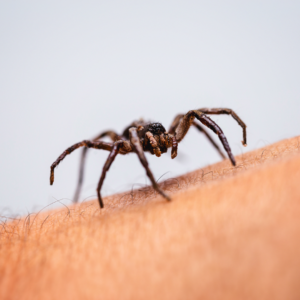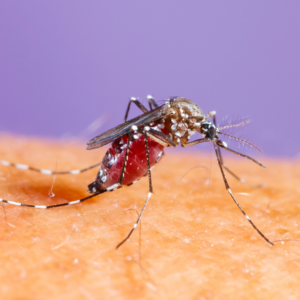Residents across proof.’s service areas are no strangers to pests, especially spiders and mosquitoes. While one pest prefers to hang around on webs or hunt in our homes, the other preys on us outdoors!
Both pests can leave their mark on our skin, but telling the difference between spider and mosquito bites isn’t always a walk in the park. Understanding these distinctions is key to effectively treating bites and keeping these pests from overtaking our homes and yards.
So, let’s dive in and explore the unique traits of these pests and discover how their bites can impact us—from mild symptoms to potentially serious reactions.
Spider Bites
While uncommon, spider bites can cause their fair share of issues. Depending on the size of the pest, you may spot two tiny puncture marks at the center of the spider bite.

Like most pest bites, spider bites can develop into raised, itchy bumps or lesions over time. However, venomous species can cause more severe reactions and skin conditions that require medical attention.
Common Symptoms
Symptoms can vary widely depending on the type of spider and your reaction to the venom. Common symptoms include localized pain, redness, swelling, and itching at the site of the bite.
Some individuals may also experience systemic symptoms such as fever, headache, nausea, and muscle cramps. These symptoms typically subside after a few days, but we suggest seeing a medical professional to avoid potential complications– especially if the area doesn’t get better.
Types of Spiders that Commonly Bite Humans
Most spiders aren’t aggressive and avoid biting humans unless threatened or cornered. Once a spider senses a threat, they will lash out and deliver one of their characteristic bites.
Some of the most common spiders that bite humans are the brown recluse, black widow, hobo, and wolf spiders. Most bites occur due to improper handling or accidental encounters, like putting on shoes or clothing or laying down on the arachnid.
To avoid bites, we recommend never touching these pests with your bare hands and avoiding picking them up entirely if possible. Before putting on your shoes or clothing, shake them out to dislodge any hiding spiders. Remove clutter to eliminate potential hiding spots that may encourage them to take up residence in your room.
Mosquito Bites
When mosquitoes strike, they leave behind telltale signs that distinguish their bites from others. Mosquito bites typically appear as small, raised bumps on the skin, often accompanied by redness and mild swelling.

While almost visually similar, one of the key differences between spider and mosquito bites lies in minute details in appearance. Unlike spider bites, which may leave pairs of puncture marks, mosquito bites usually present as single lesions.
Common Symptoms
After a mosquito feed, you may experience the following symptoms hours to days afterward:
- Swelling
- Large welts
- Localized redness
- Intense itching at the site of the bite
- Multiple bites scattered throughout your body
Repeated scratching can lead to secondary infections, increased inflammation, and more severe symptoms. If these wounds cannot properly heal and close, you could inadvertently introduce bacteria and cause a nasty infection.
Diseases Transmitted by Mosquitoes
Mosquitoes aren’t just pesky biters; they’re also notorious vectors for a slew of diseases. Some of the most prevalent mosquito-borne illnesses include malaria, dengue fever, Zika virus, West Nile virus, and chikungunya.
According to the Centers for Disease Control (CDC), West Nile virus is the most common mosquito-borne illness in the United States, but there have been outbreaks of dengue fever, chikungunya, and the Zika virus in some states and territories.
These diseases vary in severity, ranging from mild flu-like symptoms to life-threatening complications. If you’re bitten by an unknown pest and are experiencing any illness or pain, we recommend contacting your doctor.
Difference Between Spider and Mosquito Bites
Spider and mosquito bites have distinct features that make them easy to identify. Spider bites often present as localized redness, swelling, and pain at the bite site, occasionally accompanied by two puncture marks resembling fangs. Mosquito bites typically manifest as small, raised bumps on the skin, often accompanied by redness and itching.
However, there are other differences that set these bites apart, namely the side effects and problems these bites cause.
Bite Severity
Spider bites can vary widely in severity, with most cases resulting in mild symptoms that can be managed with basic first aid. However, some bites can lead to more severe reactions and complications.

The brown recluse spider, known for its cytotoxic venom, can cause necrotic lesions and tissue damage in the area surrounding the bite. This necrosis, or tissue death, may require medical intervention, including debridement and wound care, to prevent further complications.
Black widow spiders produce neurotoxic venom that affects the nervous system, leading to severe muscle cramps, abdominal pain, nausea, and vomiting. In severe cases, black widow spider bites can result in hypertension, tremors, and difficulty breathing; always seek medical attention if you begin to experience these symptoms.
But what about the difference between spider and mosquito bites? Mosquito bites, on the other hand, are generally considered minor nuisances. In most cases, mosquito bites cause localized redness, swelling, and itching at the site of the bite. These symptoms typically resolve on their own within a few days by applying topical anti-itch creams or taking antihistamines to alleviate itching.
Severe reactions are rare but can include hives, extreme itching, or anaphylaxis. Anaphylaxis is a medical emergency characterized by symptoms such as difficulty breathing, swelling of the face and throat, and a drop in blood pressure, and requires immediate medical attention.
Besides the physical effects, mosquitoes can transmit serious diseases with their bites. The severity of mosquito-borne diseases can vary widely, with some causing flu-like symptoms that resolve on their own and others leading to serious complications or death if left untreated.
Long-term Effects
Spider bites from venomous species can leave lasting effects, but this is often rare. Brown recluse bites can develop into necrotic wounds, where the tissue surrounding the bite site begins to die.
Without prompt medical intervention, these wounds can worsen and may require extensive medical treatment to prevent further complications. Even swift intervention can leave you with long-term scarring if your symptoms begin to rapidly worsen.
Mosquito bites from uninfected pests typically don’t have long-term effects. However, if a mosquito bite transmits a disease like malaria, dengue fever, Zika virus, or West Nile virus, the consequences can be more severe and may necessitate ongoing medical treatment and monitoring.
For instance, Zika virus infection during pregnancy can cause birth defects like microcephaly and other neurological complications in newborns. The West Nile virus infection can lead to neurological complications, including encephalitis or meningitis, which can have lasting effects on your health. In terms of long-term events, the difference between spider and mosquito bites is stark, with some mosquito bites leaving you with difficult symptoms down the line.
Contact proof. For Mosquito and Spider Control!
So, what should you do against these pests? How should you protect yourself against painful, itchy, and dangerous bites? Contact the pros at proof.!
With our comprehensive mosquito services and seasonal Pest-free Guarantee treatment, you can stay protected from pests no matter the season. We’ll eliminate growing mosquito infestations in the warmer months and send spiders packing with cobweb removal during fall and winter.
For more information, contact us today!

